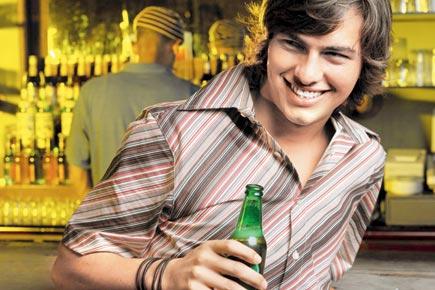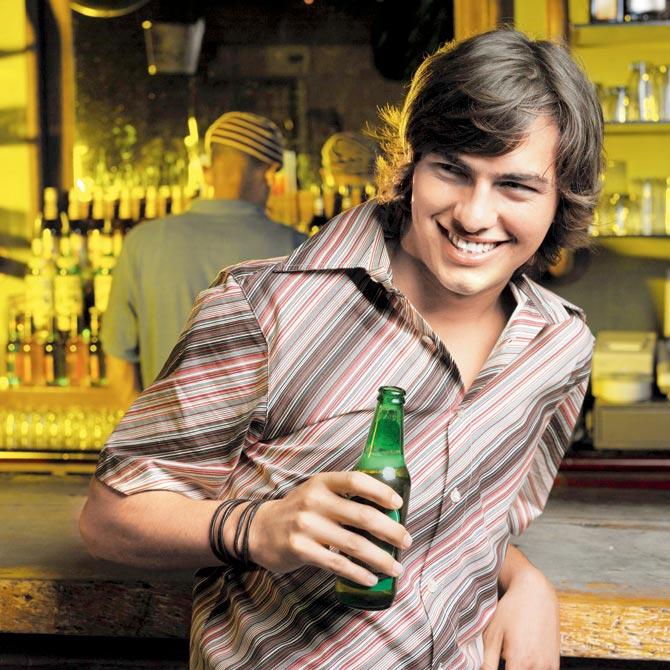Booze is demonised/deified, why not place it in perspective


As a substance that relaxes the mind, drinking does help you connect with people. Pic for Representation/Gettyimages
ADVERTISEMENT
 Khushwant Singh, I'm told, once famously went up to LK Advani and said, "You don't smoke. You don't drink. You don't womanise. You're a dangerous man!" Now one can endlessly debate the dangers (or not) of being Advani, but clearly a man who gains no highs from anything external, ever, must be perennially inebriated on a reserve derived from within-perhaps unbridled ambition, or power, in Advani's case.
Khushwant Singh, I'm told, once famously went up to LK Advani and said, "You don't smoke. You don't drink. You don't womanise. You're a dangerous man!" Now one can endlessly debate the dangers (or not) of being Advani, but clearly a man who gains no highs from anything external, ever, must be perennially inebriated on a reserve derived from within-perhaps unbridled ambition, or power, in Advani's case.
For years I've sort of agreed with the late Khushwant. Having made hardly any teetotaler friends for all my adult life, I get perhaps unduly suspicious sometimes of people who don't drink, or cut themselves slightly loose once in a while-preferring to remain sober and thoroughly in control of their bored senses throughout. All these people resort to the cliché, "I'm high on life," when asked why they've never even been curious enough to try alcohol as a temporary escape from a long day, bad day, good day, regular day… I feel, perhaps unnecessarily, sorry for them, as if they're missing out on a pleasure so intrinsic to the human race.
It's not that all my friends are alcoholics. If anything, given changes in lifestyle over years, they've in fact cut down on their intake. But why do they drink in the first place? Since this question has aroused my own curiosity lately, I have conducted my own survey-with a fairly large sample size, although, for some reason, comprising only men, majority of them single, and between the age-group of late 20s, to early to mid-40s. I have basically distilled their very honest responses into two most common ones: "Drink to get laid." "Drink to bond better." Both, by the way, emanate from the same effect of alcohol, which is that it frees us from inhibitions, so far as expressing our feelings are concerned, therefore Dutch courage, and a lack of emotional filter. As a substance that relaxes the mind, it does help you connect with people-more easily with strangers, and even more deeply with friends.
Here's why booze is still such a double-edged sword. Medically it is classified as a depressant-a 'downer', as it were. Which is strange, but the law of serious diminishing returns begins to apply after a certain threshold dosage, and it's downhill thereafter, often leading to a creepy/obnoxious or emotionally/ physically abusive behaviour. This is why, given a choice, I only drink mild beer, the alcohol content of which hovers around four to five per cent.
Because if you're going to binge on everything like beer - vodka, whisky, rum - alcohol content in all of them starting at around 40 per cent - chances are you won't have a liver, or enough tolerant people to live with. Frankly I don't know a single beer drinker who turned into an alcoholic, which of course is not true for consumers of all other forms of booze, barring red/white wine, perhaps.
The alcohol still works on different people in different ways. Some can't handle it at all, regardless. Some can handle it so well, that it's a problem. According to me, the early alarm bells for alcoholism set in when someone veers towards regularly binge-drinking alone. This is the drinker who's no more using the substance as a social lubricant. I might be making a broad generalisation here. But having seen enough people go down that route, it is a little scary.
Why do some people recklessly take that road though? I thought I'd ask rock-star Sanjay Dutt, the best-known Indian survivor of addiction there is. After a decade of substance abuse, when Dutt checked into rehab in the US in the '90s, the doctors were flummoxed scanning his reports at all that they'd found in his system-he'd consumed every possible shit in the world. The fact that he was alive at all was a mystery to them. "What do you Indians eat (to digest that many substances)," the doc had asked him. He's been clean for many years, although I'm not sure that's still true for alcohol.
Being the most experienced of the lot, his point is quite simple-that there is absolutely nothing enjoyable about any substance that externally, temporarily alters your mood. One can actually achieve the same high, and even better-through adrenaline, produced by the body itself- via life, family, or work. The other thing, he says, is the 'addictive personality'. If you're one (and 80 per cent chances are that you are), the same drug/alcohol that brings you pleasure at a controlled dosage, leads you to depression, when you can't limit its quantity, seeking to heighten the same pleasure, and upping the scale with growing immunity to the drink's effects. If you can stop at two to three drinks? Great. If not, then? Hmmm.
It's a point that's got me thinking about alcohol anew. And where I am thinking about this? At a bar, surrounded by people, most of whom I've met for the first time - we're being chatty, affectionate, exchanging stories and notes on life, making plans to take the party forward elsewhere, since this is already so much fun. Honestly, I'd be a wholesome bore if there was no booze involved. Mr Advani doesn't need any of that. I envy him. But cheers to that!
Mayank Shekhar attempts to make sense of mass culture. He tweets @mayankw14. Send your feedback to mailbag@mid-day.com
 Subscribe today by clicking the link and stay updated with the latest news!" Click here!
Subscribe today by clicking the link and stay updated with the latest news!" Click here!






